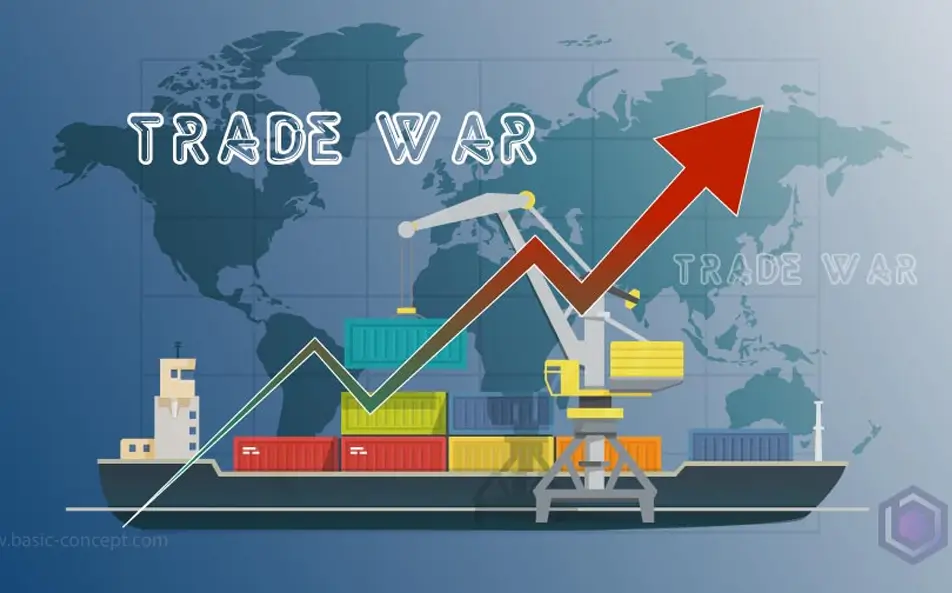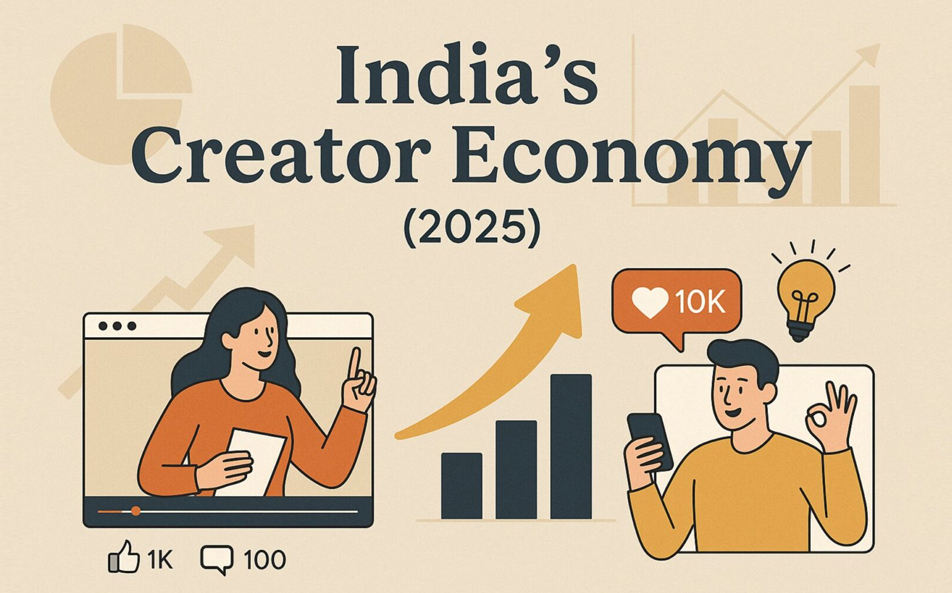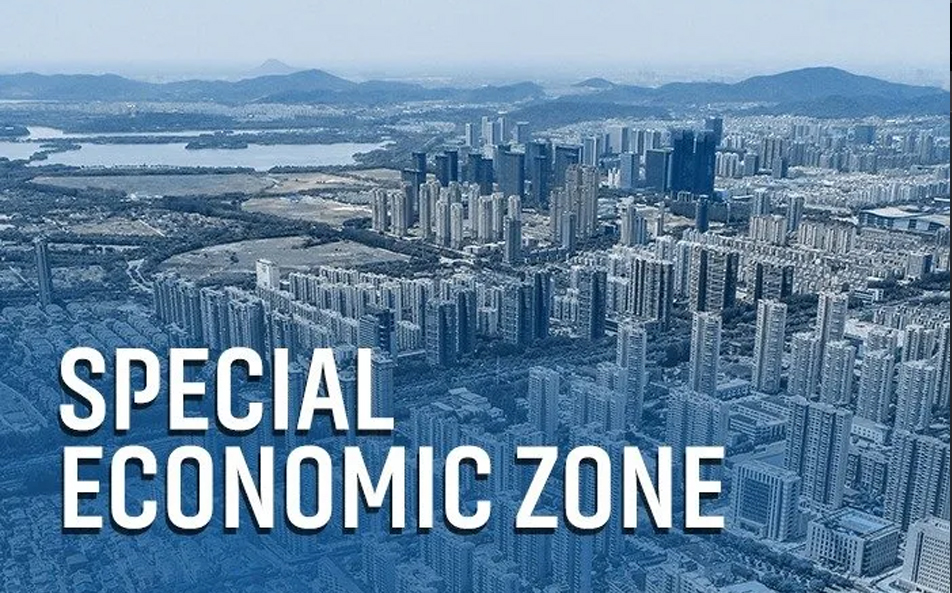
The United Indian

In recent years, the escalating trade tensions between the world's two largest economies, the United States and China, have caught the global economy in a whirlwind of uncertainty. These trade wars—rooted in tariff hikes, supply chain disruptions, and geopolitical rivalries—are not just bilateral skirmishes but have far-reaching consequences for countries worldwide. Among these, India finds itself in a unique position: both challenged and poised to benefit.
What is Trade War?
A trade war develops when two nations impose import restrictions or increase import tariffs . A tariff is a tax or similar fee that a country imposes on imports.
A trade war might have adverse impacts on both countries, their industries and consumer emotions, which would undermine many sectors of their economies. Trade war supporters, on the other hand, believe that such agreements benefit domestic businesses and serve to safeguard national interests.
Trade wars are a natural outcome of protectionism, which is mostly the result of governmental acts and regulations that limit global trade. Protectionism is a strategy used by nations to stave off foreign competition in their local markets and employment markets.
Protectionism also describes a strategy for reducing trade imbalances. A country has a trade deficit if its imports are greater than its exports.
US China Trade War
The US China trade war officially began in 2018 when the United States, under the Trump administration, imposed tariffs on roughly $350 billion of Chinese imports, accusing China of unfair trade practices such as intellectual property theft and forced technology transfer. China retaliated with it own tariff on $100 billion US exports, and thus began a tit-for-tat escalation of protectionist policies. Although some deals have been reached, tensions have persisted under the Biden administration, though the focus has shifted more towards national security concerns, technology, and geopolitics.
In simple terms, the US China trade war, characterized by tariffs, trade barriers, and economic sanctions, has been fueled by a complex interplay of factors, including intellectual property theft, technology transfer, and trade imbalances. While the primary aim of these measures is to protect domestic industries and address perceived economic injustices, the consequences extend far beyond bilateral relations.
Why the US China Trade War Matters to India
As global economic dynamics shift, the US China trade war presents a mixed bag of challenges and opportunities for India's economy, influencing its exports, imports, and overall trade strategies. India's economy is deeply interconnected with both the US and China, its two largest trading partners. As the world’s fifth-largest economy, India cannot remain immune to the ripple effects of the trade war. Any slowdown in the economies of the US and China—resulting from their trade disputes—affects India’s trade balance, foreign investment, and global supply chains.
India's Trading Terms With US & China
The escalating tensions between the United States and China, have far-reaching implications for the global economy. India, as a major player in the international trade landscape, is particularly vulnerable to the fallout of these trade disputes.
Its important to look at some key statistics to understand the trade relations between India & China, India & US:
India-US Trade: The US is India’s largest trading partner, with bilateral trade amounting to around $128.55 billion in 2022-23.
India-China Trade: Despite political tensions, China remains India's second-largest trading partner. In 2022, the bilateral trade between India and China stood at $135.98 billion, with India facing a significant trade deficit of $101 billion.
Given these figures, any disruption in US-China relations has the potential to impact India's export and import landscape significantly.
Impact on India's Exports
One of the immediate consequences of the US China trade war has been a reconfiguration of global supply chains. As US companies seek alternatives to Chinese suppliers to avoid tariffs, many have turned to countries like India, Vietnam, and Indonesia.
Opportunities for Indian Exports:
Textiles and Garments: India’s textile sector has benefitted as many US retailers have shifted their sourcing from China to India. The Indian garment industry has seen increased orders from US buyers looking to diversify their supply chains away from China.
- Electronics and Smartphones: India has emerged as a potential hub for electronic goods manufacturing. The Indian government’s "Make in India" and Production Linked Incentive (PLI) schemes have attracted global giants like Apple and Samsung, which are looking to diversify away from Chinese manufacturing.
- Agriculture: The US imposed hefty tariffs on Chinese agricultural products, including soybeans, making India an attractive alternative for American importers. India's agricultural exports to the US, particularly rice and cotton, have seen a significant uptick.
- Pharmaceuticals: India is the largest supplier of generic medicines to the US. With China facing supply chain disruptions, India’s pharmaceutical sector has stepped in to meet global demand, bolstering its export potential.
Challenges for Indian Exports:
While opportunities exist, there are also challenges. Indian companies face stiff competition from other Southeast Asian nations such as Vietnam and Bangladesh, which have also positioned themselves as alternatives to China. Furthermore, India’s infrastructure and regulatory hurdles often make it less competitive than other nations in attracting investment and scaling up production capacity.
Impact on India's Imports
India relies heavily on China for a wide range of imports, including electronics, machinery, chemicals, and pharmaceutical ingredients. Despite tensions, China remains the largest source of imports for India.
Statistics show that India imported $677.2 billion worth of goods in total in 2023–2024, with $101.8 billion coming from China. This indicates that 15% of all imports into India came from China. Of the $100 billion or 98.5% of these Chinese imports, key industrial product groups accounted for the majority.
Implications of Supply Chain Disruptions:
- Electronics and Technology: A significant portion of India's imports from China consists of electronics and hardware components. The US-China trade war and subsequent sanctions on Chinese tech companies have created supply chain disruptions, affecting industries in India that depend on these imports, such as consumer electronics and telecommunications.
- Pharmaceutical Ingredients (APIs): India imports around 70% of the raw materials for its pharmaceutical industry from China. Any disruption in supply, whether due to trade wars or pandemic-related shutdowns, could lead to shortages in the production of generic medicines, impacting both domestic health services and export markets.
- Automobile Industry: India's automobile sector also depends on Chinese components. Disruptions in trade can delay production and increase costs for Indian manufacturers, potentially affecting the competitiveness of Indian exports in this sector.
India as a Manufacturing Hub: Can It Seize the Opportunity?
US China Trade War has led both the countries reassess their supply chains, India has a golden opportunity to position itself as a global manufacturing hub. The Indian government has been proactive in promoting initiatives like "Make in India" and "Aatmanirbhar Bharat" (Self-reliant India). These initiatives aim to reduce dependency on imports and boost domestic manufacturing.
Key Developments:
- PLI Schemes: The Production Linked Incentive (PLI) scheme, introduced by the Indian government, provides financial incentives to companies that increase domestic production in sectors such as electronics, textiles, and automotive components. Several multinational companies have taken advantage of these schemes to establish or expand manufacturing bases in India.
- Ease of Doing Business: India has made strides in improving its business environment by simplifying regulations, speeding up approvals, and improving infrastructure. According to the World Bank's "Ease of Doing Business" report, India jumped 79 positions between 2014 and 2019.
- Investment in Infrastructure: The government has announced several initiatives to improve transport and logistics infrastructure, essential for building a competitive manufacturing base. The development of industrial corridors, such as the Delhi-Mumbai Industrial Corridor, aims to facilitate faster movement of goods.

Challenges in Becoming a Global Hub:
Despite the potential, India still faces significant challenges in becoming a manufacturing alternative to China. These include bureaucratic red tape, high costs of land and electricity, and labor issues. Additionally, India’s fragmented logistics and transportation systems often result in higher costs and delays compared to China’s highly efficient infrastructure.
Geopolitical Implications
The trade war is not just about economics; it is also about geopolitics. The rise of protectionism and economic nationalism worldwide has reshaped alliances and global trade strategies. India’s stance in this evolving landscape will be crucial.
- Strengthening Ties with the US: India has been strengthening its economic and strategic ties with the United States, which is likely to deepen further as both countries seek to counterbalance China's growing influence. The Quad (Quadrilateral Security Dialogue), which includes India, the US, Japan, and Australia, is one such strategic grouping that could benefit from closer trade ties.
- Navigating Tensions with China: On the other hand, India’s relationship with China remains complex. While India seeks to reduce its dependency on Chinese imports, particularly in sensitive sectors like technology and defense, it cannot completely sever trade ties given the sheer scale of bilateral trade.
- Global Multilateralism: India could play a vital role in reshaping global trade policies through multilateral forums like the World Trade Organization (WTO) and the G20. By advocating for more equitable and open trade practices, India can push for reforms that benefit developing nations.
Conclusion: A Mixed Bag for India's Economy
The US China trade war has undeniably created both challenges and opportunities for India. On the one hand, it offers India the chance to emerge as a global manufacturing hub, attract foreign investment, and expand its export base, particularly in sectors like textiles, electronics, and pharmaceuticals. On the other hand, India's heavy dependence on Chinese imports, especially in critical sectors like electronics and pharmaceuticals, makes it vulnerable to supply chain disruptions.
To fully capitalize on these opportunities, India will need to continue improving its business environment, infrastructure, and regulatory framework. At the same time, it will need to strike a delicate balance in its geopolitical relationships, navigating the complex terrain of US-China tensions while protecting its own economic interests.
In the long run, India's ability to adapt and innovate will determine whether it emerges as a key player in the reshaped global trade landscape. The trade wars between giants may just be the push India needs to realize its full economic potential.
References
https://en.wikipedia.org/wiki/Trade_war
https://cleartax.in/glossary/trade-war
https://www.nber.org/system/files/working_papers/w25762/w25762.pdf
Read more in Economy
Jun 24, 2025
TUI Staff
Jun 22, 2025
TUI Staff

Stay Tuned with The United Indian!
Our news blog is dedicated to sharing valuable and pertinent content for Indian citizens. Our blog news covering a wide range of categories including technology, environment, government & economy ensures that you stay informed about the topics that matter most. Follow The United Indian to never miss out on the latest trending news in India.
©The United Indian 2024















